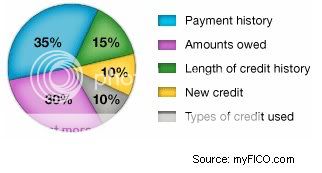Your credit score plays an increasingly important role in your financial health. But what is it? And how does it affect what you pay for loans and credit cards?
Your credit score is a single number that indicates your creditworthiness. This number is derived from various pieces of information contained in your credit report. Your credit report is accumulated by various credit agencies — credit card companies and banks and other financial institutions, who pass along information about how much you owe, how well you pay, and how long you’ve been a customer. Your credit score determines the types of credit you can obtain, and how much you will be charged in interest.

In general, your credit score is based on the following:
According to Fair Isaac, the company behind credit scores, these factors are accurate predictors of future credit performance. That is, these are the things that best indicate how great a credit risk you are. (For some people — such as young adults who don’t have a lengthy credit history — the importance of each category may be somewhat different.)

For more detailed information about the components of your credit score, check out the following pages at myFICO:
What’s in your score?
What’s not in your score?
Improving your FICO score.
myFICO states that the median credit score in the United States is 723: half of the population has a score of 723 or above, and half of the population has a score of 723 or below. myFICO also provides the following table, which indicates how your credit score affects what you pay for a loan:
For a $216,000 30-year, fixed rate mortgage:
If your FICO®
score is: Your interest
rate is: …and your monthly
payment is:
National interest rates as of 02 June 2006
760 – 850 6.33% $1,341
700 – 759 6.55% $1,373
680 – 699 6.73% $1,398
660 – 679 6.95% $1,429
640 – 659 7.38% $1,492
620 – 639 7.92% $1,573
How much can you save if your credit score is 760 instead of 699? In the example provided above, you would save $57/month on interest payments. That’s $684/year.
A recent federal law gives consumers access to their credit reports, however it costs extra to obtain your credit score. Your credit score is not an actual component of your credit report.
The Fair Credit Reporting Act (FCRA) requires each of the nationwide consumer reporting companies — Equifax, Experian, and TransUnion — to provide you with a free copy of your credit report, at your request, once every 12 months.
If you’d like, you can obtain reports from all three credit reporting agencies at once. Or, you can stagger your requests, possibly requesting one report every four months from a different agency. There are three ways to obtain your credit report:
Order it online at annualcreditreport.com.
Call 1-877-322-8228.
Complete the Annual Credit Report Request Form and mail it to: Annual Credit Report Request Service, P.O. Box 105281, Atlanta, GA 30348-5281.
No comments:
Post a Comment